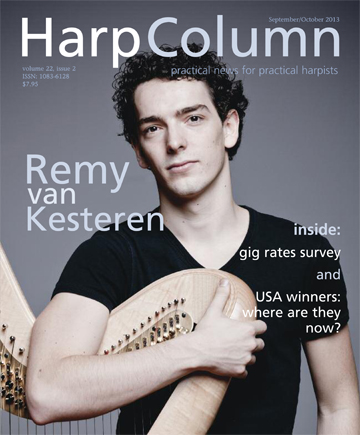Question: How do you turn down people who ask you to play for free for a non-profit, charitable event? I always feel guilty when I say no!

” I don’t know about you, but it annoys me to play for free at an event where the cost for having the event could buy me a new harp!” says Robbin Gordon-Cartier.
I believe that everyone should have a charity, cause, or group that they support both financially and physically with as much or as little as they are willing to give. I think it is really important to give back to causes in which you believe.
[protection_text]
That said, there are many harpists who actually cringe when they hear the word “fundraiser” from a potential client. To me, the very word is an oxymoron because there is not much fun in performing for free because you were coerced into donating your services. Many times, the people who approach you for these donations are having the event at expensive venues that consume most of the profits that could have gone to the cause. I don’t know about you, but it annoys me to play for free at an event where the cost for having the event could buy me a new harp! This is one of the reasons you must know going into the conversation what you already do for charities and charge for these jobs the same way you charge for events not called fundraisers.
If after you have been paid you decide to donate to the cause, do so with a check of your own. The IRS does not allow deductions for donations of services and it is your service that allows you to earn a living that affords you the money to support the causes in which you believe.
You must not waver in your first response or allow an attempt by the client to negotiate the service.
So how do you say no to people who ask you to play for free? You open up your mouth and just say, “No.”
—Robbin Gordon-Cartier, harp instructor at Cicely Tyson School of Performing and Fine Arts; East Orange, N.J.

“If the event is close to home I might offer to play for one hour instead of my typical two hour minimum,” says Cindy Horstman.
When I am asked to play for free by a non-profit or charity I always try to respond with an educational approach. I mention that I make a living by playing the harp and give them my hourly rate.
If the event is close to home I might offer to play for one hour instead of my typical two hour minimum. This one hour rate may work within their budget and will hopefully show them that I am flexible and willing to support their cause.
Sometimes I mention the “hidden costs” of playing a gig including transportation and cost of the instrument and its maintenance.
If the charity is one that is near and dear to me, sometimes I offer them a reduced rate and ask them to include my name in their advertising and promotional materials along with my contact information. After all, most charity events are attended by people who are willing to donate money, socially active, and probably host events as well. Because of this, I also request permission to visit and network with the guests and vendors at the event.
This may be an excellent opportunity for other potential clients to meet and hear me. Think of it as a paid audition!
—Cindy Horstman, harpist, composer, arranger; Dallas, Texas
Simply because there are only 168 hours per week, it would not be possible to play for each non-profit organization that requests free harping services.
So I respond with that old standby—the truth! I explain that I have several favorite charities I play for on a regular basis, usually at their annual galas. And due to teaching, rehearsing, and performing commitments, I cannot play for any others.
I frequently mention my awareness of their organization and the numerous good deeds they perform.
Also, there are two ideas I suggest to lessen the blow of their disappointment: I offer to send them one of my CDs if there is going to be a Silent Auction associated with the charity’s event, and I always encourage them to call one of my advanced students. This works wonders on several levels. It gives the pupil the experience of playing for a receptive group, the organization has lovely harp music for their event, and it helps assuage my guilt in turning down a request from a worthwhile cause! •
—Karen Strauss, teacher, performer, and president of the Long Island Chapter of the AHS
Long Island, N.Y.
Coming up: A former student asked me to play for her wedding. Should I charge? If so, should it be my normal fee?







